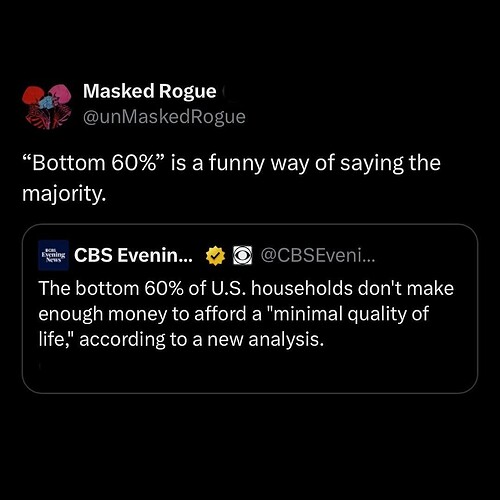For those who didn’t get the message when unregulated mortgage companies tanked the real estate industry.
The entire point is the continued destabilization of the Middle East, and a massive payout for oil industry chums.
Robert Reich in an interview on Democracy Now! discusses Mamdani’s win in NYC and lessons the Democratic Party / establishment should learn about economic populism:
Also, here’s his video with Lina Khan on how monopolies steal our freedom:
This is pretty wild, even one of Leon’s comments on EGGS was technically correct - how weird is that?
As NPR reported, more intense storms driven by the overheating planet have caused insurance premiums to rise by around 24% in the last few years, according to the Consumer Federation of America.
Major insurance companies and banks have refused to offer coverage in parts of high-risk states, including Texas, California, and Florida, leaving homeowners with the difficult decision of either finding a new provider, often with higher premiums, or risk going without insurance.
“If you fast-forward 10 or 15 years,” Federal Reserve Chair Jerome Powell said, “there are going to be regions of the country where you can’t get a mortgage.”
If huge swaths of the country are uninsurable and people can’t get home loans, that would have cascading impacts on communities. Property values would plummet, and without sufficient revenue from property taxes, cities would struggle to fund essential public services, including schools, police and fire departments, infrastructure projects, and other vital needs.
- Maybe it’ll get hedge funds out out residential properties?
This will also leave many recent home buyers upside down on their mortgages, which will result in an increase in loan defaults, which will negatively impact banks. Cascading effects, indeed.
It seems more likely to increase their involvement, as the ones with deep enough pockets to not need a mortgage. Also, there’s this trend to consider:
Fewer mortgages and more foreclosures could increase rental units. Renters unable to get insurance would be at risk.
I’m not sure that the assessed value of a house / taxes would change as a rental - unless improvements or NKOTB rules apply. Either way, that’s always reflected in the rent. It’s another area where the wealthy might make it impossible for those who aren’t rich to own anything. ![]()
The expert is Ken DiCross, active in crypto for the last 10, 15 years, founder/co-founder/CEO/CFO of at least a dozen1) crypo-related companies.2)
His latest venture is Wire Network, “Blockchain’s Universal Transaction Layer”, which has a cool logo.
It’s also one of the companies that would massively profit from enabling trading with said tokens.
So yeah, this is basically PR blurb.
But we’ll all gonna be rich, honestly!
1) It’s hard to keep track, really. I think it’s called “serial entrepreneur” these days.
2) Some of which may even still exist today.
The new bill sets up a three-tiered system: Private colleges with more than 3,000 students and an endowment per student of $500,000 to $750,000 will pay 1.4%. Those, like Penn, with $750,000 to $2 million per student will be taxed at 4%, and those with greater than $2 million per student, 8%.
I guess it’s good that they got a break, and hope the rest find options to delay payments. After all, ![]()
![]() is the poster boy for not paying what he owes (especially taxes). Those estimated amounts for larger colleges and universities should send them all running to find teams of competent, creative accountants.
is the poster boy for not paying what he owes (especially taxes). Those estimated amounts for larger colleges and universities should send them all running to find teams of competent, creative accountants.
![]()
![]()
Weirdly, this might be unexpectedly good news for women’s colleges (the few that are left) and HBCUs. Especially with the tiered endowment limits, as these colleges & universities don’t have the luxury of massive endowment funds.
All of a sudden, Harvard is going to have 50,000 students paying $1 per term.
I can see Harvard restructuring with 50 different semi autonomous colleges under the university- like Oxford? But they pool the management of their endowments.
I’ve read a few updates about the ongoing (and expanding) boycotts against corporations supporting actions taken by the regime. First they focused on rolling back DEI, then billionaires involved in dismantling democracy (while engaging in obscene displays of privilege), and now companies enabling ICE have joined the list. Even food truck companies are getting backlash. Here’s a video that begins with Amazon’s Prime Day and goes into more detail about the rest:
There’s also news about the countries boycotting the US:
Now I’m wondering if a general strike would work:
![]()
A general strike would be amazing, but I worry there are enough people in precarious situations who can’t take that economic hit. I’m sure mutual help and charity schemes are going on, but I doubt they’re robust enough to deal with that sort of influx…





